“If something is ‘great for SEO’ but not good for business, it’s also bad for SEO.”
– Dan Shure.
Hey👋, Rafiqul here. Welcome to Content Marketing VIP that delivers actionable insights, the latest updates, & free resources bi-weekly, for free.
First time here? Read past episodes.
Let’s get started →
Table of Contents
🎯 Actionable Insights
💡 1. SEO Case Study | Getting 47.6k Clicks From Google In 3 Months
Google’s video tab can be a powerful way to drive a good number of visits to your website.
Here’s how:
Luke Jordan recently shared a case study where he generated 47.6k clicks from the ‘Google video tab’ alone just by embedding their YouTube videos in the articles.
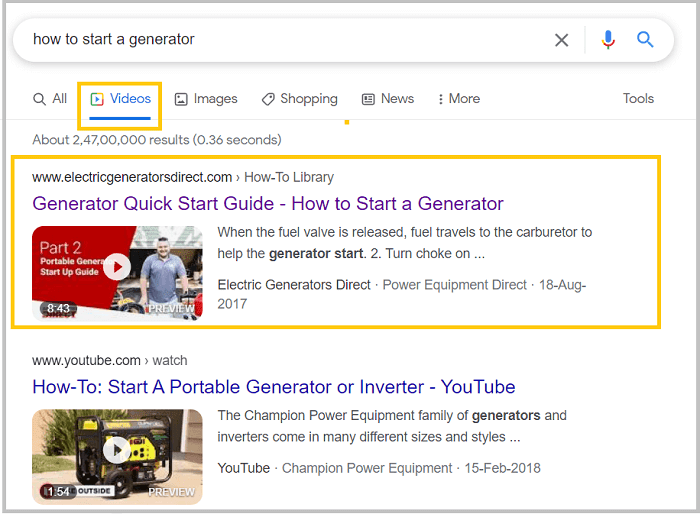
Note: These videos were published on their own channels.
So if you’re also creating content in video and text format, then you may consider embedding videos in relevant content.
Benefits?
Traffic from Google and YouTube for the video content. In fact, the views coming from Google may also lead to a higher ranking in the YouTube algorithm.
👉 Insights from Luke Jordan
💡 2. Can I Rank For This Keyword? Here’s The Answer
Here is a 4 point checklist that I use every time to evaluate the ranking opportunity of a keyword 👇
1/ Search Intent
1st, understand the WHY behind users’ query.
2nd, study the top 10 pages.
SERP features will also help you understand the intent.
Now, answer what type of page is relevant for the query?
– Product page/category page/directory listing/blog article/etc.
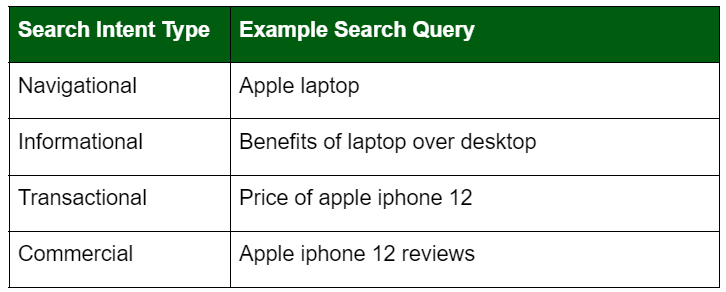
Next, find the USP for the search query.
e.g., some queries are time-sensitive. As a result, you may see Year/month mentioned in the title.
Likewise, it could be:
- listicle
- step-by-step, etc.
Hint: Looking at the Titles and H2 of pages will give you the answer.
2/ Backlink profile
Backlink is not all that matters. But it still matters.
Look for the top pages’ referring domains (quality & quantity).
Ahrefs’ KD is a good indicator for this.

Low-quality backlinks (even if the number is huge) of the top pages are a + signal (mostly).
3/ Topical Authority
Do the top sites have topical authority for the search query?
e.g., → There is a topical authority gap if you see most of the top pages are generic sites that do not have authority in the topic.
Niche sites (even if they’re low DA) > Generic high DA sites.
4/ Content depth & quality
Study the top pages and answer:
– Does this cover all important points that a user has regarding the search query?
If not, there may be a gap.
Word count could also give you a quick overview to understand the content depth. Still, it is recommended to read the content to get the full picture.
Also, give importance to the UI/UX.
- Does this use stock photos/ blur images/etc.?
- How easy is it to read and skim the articles?
Poor UX experience will give you a chance to beat these pages on this metric.
The role of UI/UX design is to convey the information needed to successfully perform your tasks. It makes sense for you to know how to read a website before you start designing one, so let’s take a look at the anatomy of a good user interface.
TL; DR
Can I rank for this keyword?
Look for:
1. Search Intent
2. Backlink strength (quality & quantity) of top pages
3. Content Depth & UX
4. Site’s Topical Authority
This is not the ultimate list for SERP analysis. But this will give you a rough understanding.
👉 Insights from Sk Rafiqul Islam (Get more insights on Twitter)
💡3. The About Page Isn’t Just About Adding Bio Descriptions & Social Links
Here’s a great example (from @pharmeasyapp) of about page that includes:
- Affiliation
- Awards
- Alumni Of
- Work Experience
- Research Papers
- LinkedIn URL
This helps in building Expertise & credibility 👇
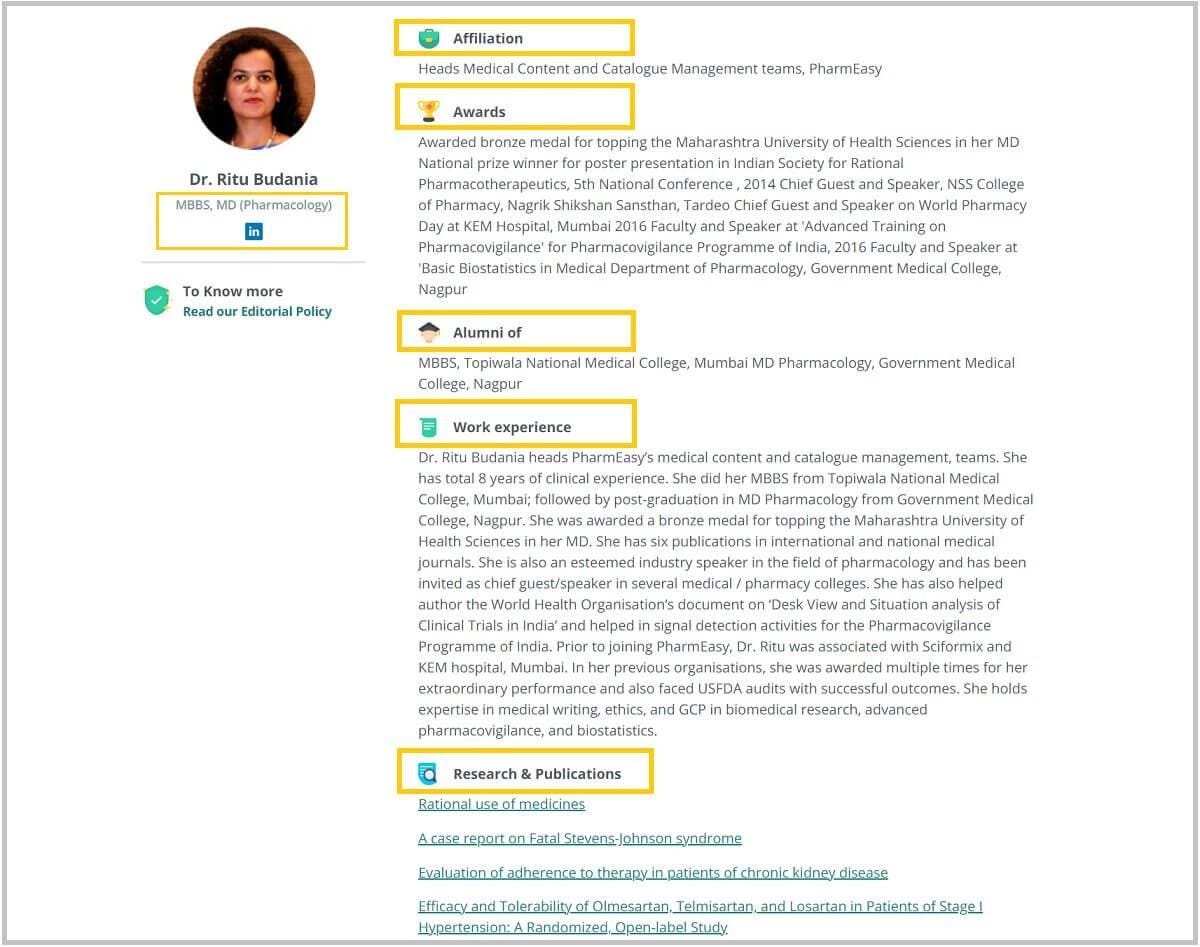
Also, PharmEasy uses structured data (recommended) to markup this additional information to search engines.
TIP: Always ensure that you’re adding all the available information about the experts/ medical content reviewer that helps in showcasing expertise and credibility.
👉 Insights from Sk Rafiqul Islam (Get more insights on Twitter)
🗓️ Free Resources & Upcoming Events
💡 1. A Free Technical SEO Resource Library | From Deepcrawl
No matter how valuable content you’re publishing, you won’t get great results if too many technical SEO issues are on your site.
Deepcrawl has built a resource library that will help you learn about technical SEO and maximize your SEO efforts in terms of ranking, traffic, etc.
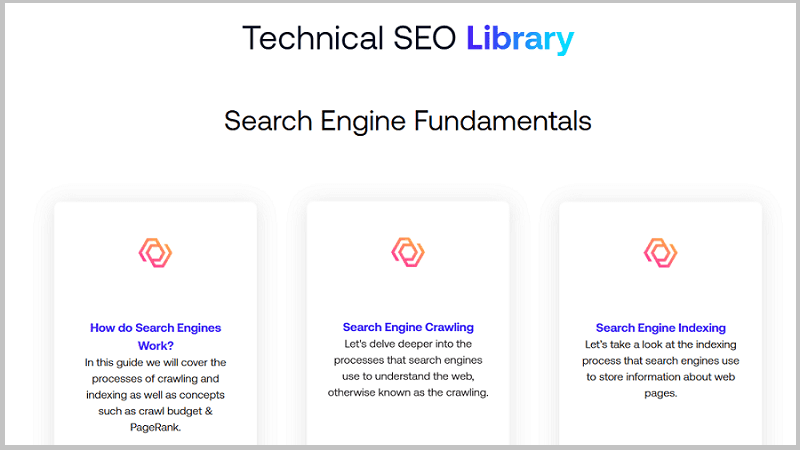
You’ll find resources on:
- Basics of search engine
- Crawl budget
- Search engine indexing
- Redirects
- Meta data
- Linking
- On page content, and many more.
👉 Start Learning About Technical SEO
💡 2. Key Enterprise Content Marketing Strategies To Know
If you want to learn about planning content strategies for enterprise brands, this webinar will be useful.
Join The Webinar And Learn:
- How to measure the content ROI for enterprise brands
- Tracking content competitors
- How to put quality over quantity and avoid churning out articles with low SEO value.
- What people are asking about your content via YouTube.
Date of the webinar: February 16, 2022
From: Search Engine Journal
(Can’t attend the webinar live? Sign up to get the recording)
💡 3. 2022 Trends in Content Marketing: Expert Discussion
It is important to keep up with the latest content trends to build successful content marketing programs.
Join The Expert Discussion And Learn:
- A 360-degree view of industry trends in content marketing and organic search
- Proven tips for building and optimizing content strategy for traffic and leads
- Unique insights on the anatomy of high-performing organic content
Date of the webinar: February 24, 2022
From: Semrush
👉 Register For The Content Marketing Webinar
💬 SEO & Content Marketing Wisdom
💡 1. SEO Tip: Focus on Building A Website For Users
“Focus on building a website for your audiences, answer their questions, satiate their curiosity, solve their problems, use the words that they will search with and expect to see on your pages.”
– Insights From By Bill Slawski (Director of Search Marketing for Go Fish Digital)
🎉 Also, it’s time to appreciate the work of Bill Slawski for publishing 40,000* articles that have helped many SEOs (including me) all over the world.
💡 2. Use Structured Data To Make Your Content Credible
For YMYL (Your-Money-Your-Life) sites, it is important to build the expertise, authoritativeness, and trustworthiness.
One of the ways of building credibility and trust is to create content that is either written or reviewed by professional experts.
But If you’re hiring medical experts to review your content (which is great), consider using the ‘reviewedBy‘ schema property.
This will tell Google that the webpage is reviewed by an expert (recommended).
Therefore helps build the credibility and trustworthiness of the webpage.
Here’s an example from PharmEasy that doesn’t use schema:
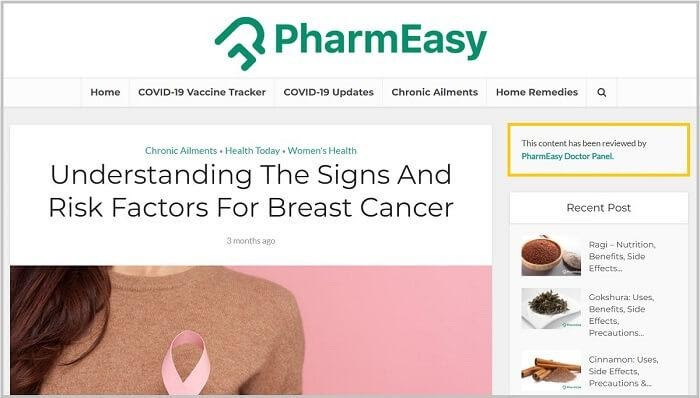
“Some types of pages or topics could potentially impact a person’s future happiness, health, financial stability, or safety. We call such pages “Your Money or Your Life” pages, or YMYL.” – Google.
– Insights From By Sk Rafiqul Islam (Creator of Content Marketing VIP)
💡 3. Get SEO Value From Original Research-Based Content
“If you publish original research on your site that is continuously cited over time, please make sure that page stays live (and indexable by search engines)
Another pro tip: of course, gating content is great for business reasons, but if you have an amazing study that receives many citations, you should probably make it indexable for SEO.
Otherwise, the rehashed versions of your study will be the ones to benefit from valuable links.”
– Insights from Lily Ray (SEO and EAT Expert)
😄 Have Some Fun
